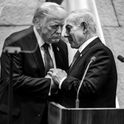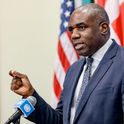Despite mounting international backlash, the Israeli military has continued its invasion of Rafah—the southernmost city in the Gaza Strip where over a million Palestinians had been told to take shelter. Images from an Israeli attack on Palestinians sheltering in tents have gone viral. One video of a headless child, the victim of heavy bombardment, has circulated widely, prompting protests around the world and violent clashes—including the setting of fires—outside an Israeli embassy. In the aftermath, some countries have attempted to impose their own penalties on the Israeli state. This has done little, thus far, to change Israel’s course of action. Indeed, national security adviser Tzachi Hanegbi has stated Israel’s intention to continue its assault on Gaza until the end of the year.
What this means for Palestinians is profound. Eight months into what many believe can be credibly categorised as genocide—myself included—Palestinians are having to address the painful reality that the ethnic cleansing of their historic homeland will be televised, and the international community will not meaningfully mobilise to stop it. Outrageous levels of violence have been unleashed by soldiers and settlers on Palestinians in the West Bank and within Israel. The message to Palestinians, certainly from the religious right, is that if the Israeli government were to have its way, Gaza might only be the beginning.
On the other hand, the Israeli public is largely supportive of the war, and a majority believe Israel’s goals against Hamas will be achieved by the war’s end. Nevertheless, a growing number of Israelis have demonstrated repeatedly in Tel Aviv and Jerusalem for a ceasefire, and new polling shows a majority would choose to end the war in order to secure the release of Israeli hostages. The families of hostages, in particular, have confronted Israeli government officials over their intransigence and seeming willingness to sacrifice their loved ones to sustain a war with unlikely—if not impossible—objectives.
Now, with the Biden administration’s endorsement of a ceasefire proposal, Prime Minister Benjamin Netanyahu and his government will be tested. Already elements of the extreme right wing that is a part of Netanyahu’s coalition have expressed their rejection of the plan, apparently intent on ethnic cleansing as their main course of action.
Netanyahu’s own interests loom large in his calculations. If ousted from power, he could face a possible prison sentence on corruption charges. And even if the American endorsement of the ceasefire proposal actually exerted enough pressure on the Israeli government to have it accept the ceasefire today, there is little guarantee that the war would not be renewed as Netanyahu attempted to cling to power. This is especially the case given public support of the war and the high likelihood of elections in the very near future. It would make sense for the prime minister, if challenged, to run on the promise of continuing the assault.
The likelihood of a Trump victory come November only exacerbates this dynamic, as Netanyahu in particular—and the Israeli right in general—has aligned itself squarely with the global right wing.
None of these steps would help to achieve the stated objectives of the war—eradicating Hamas, freeing the hostages, and ensuring Israeli security. As many analysts and experts have pointed out, the ongoing attack on Gaza only makes the conflict more zero-sum, and affirms such a view among the Palestinian population. There is no military solution to the violence, and yet, in the wake of such destruction, the possibility of coexistence becomes ever more elusive. As a Palestinian journalist from Gaza, Mahmoud Mushtaha, writes: “How can I convince people in Gaza—who have lived and grown up under a brutal Israeli siege—to live together with the very people who are responsible for their suffering?” It is difficult to see images of headless and incinerated children in Gaza and have a convincing answer to this question.
The fact that the Biden administration has refused to condemn Israel for violating US red lines—and indeed has obfuscated what is happening in Rafah, while stymieing an international response (slamming the International Criminal Court arrest warrants of Israeli leaders as outrageous, for instance) and continuing to send security assistance to Israel—speaks to the level of ideological commitment on the part of the American elite to Israeli state violence. This commitment spans bipartisan lines, but is at odds with the views of the majority of the American people. As analyst Peter Beinart has noted, such an ideological commitment is likely sustained precisely because it mirrors American state violence, in spite of the devastating role such violence has played in US history.
The tragic events in Gaza, and what will unfold in Rafah in the coming weeks, represent a critical juncture for all actors. If the Israeli assault is allowed to persist, the outcome will be disastrous. For Americans, continued support for the Israeli line will mean the erosion of the American rules-based international order, and their own democracy. For Israelis, sustained violence against the Palestinians will not buy security, but only further their isolation on the world stage and exacerbate conditions for mass violence in Israel-Palestine. For the Palestinian public experiencing and witnessing this assault, the lesson learned will be that there is no meaningful future within this international system, and with this set of actors. This will take the region down an uncharted path—one which is dangerous for all involved.













